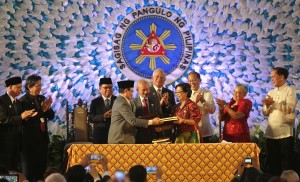Philippine News
Contentious issues in draft Bangsamoro Basic Law reconcilable — GPH panel member

(Photo by Gil Nartea/ Robert Viñas/ Rodolfo Manabat/ Malacañang Photo Bureau)” width=”300″ height=”182″ /> President Benigno S. Aquino III and Malaysian Prime Minister Najib Razak witness MILF Peace Panel chairman Mohagher Iqbal, GPH Peace Panel chairperson Professor Miriam Coronel-Ferrer and Malaysian facilitator Tengku Ghafar affix their signature to the Comprehensive Agreement on the Bangsamoro in a ceremony at the Kalayaan grounds of the Malacañan Palace on Thursday (March 27). Also in photo are MILF chairman Al Haj Murad Ebrahim and Presidential Adviser on the Peace Process Secretary Teresita Quintos-Deles. (Photo by Gil Nartea/ Robert Viñas/ Rodolfo Manabat/ Malacañang Photo Bureau)
ZAMBOANGA CITY — Government negotiators are positive that the outstanding and contentious issues in the draft Bangsamoro Basic Law (BBL) can be harmonized soon, noting that the indomitable commitment of the Philippine government and the Moro Islamic Liberation Front (MILF) to arrive at a mutually acceptable bill is the key to overcome the difficulties currently being faced by the Parties.
In a peace forum organized by the Ateneo de Zamboanga University on Tuesday here, government peace panel member Senen C. Bacani told participants that having a healthy communication line between the parties has helped them achieve consensus and breakthroughs despite the challenges relating to the draft Bangsamoro Basic Law.
“Let me clarify, there’s no stalemate in the drafting of the BBL,” he said, adding that both sides are intent on finding mutually acceptable formulations.
“Once the president is comfortable with the draft bill, he will submit it to Congress,” Bacani said. He also explained to the audience the legislative process a bill typically undergoes prior to enactment into law.
Bacani said he is confident that the current differences in the draft bill are “reconcilable.
”
He said some of the issues with the BBL that the panels are trying to solve involves finding the right legal language that will embody the principles of the Comprehensive Agreement on the Bangsamoro (CAB) that was signed by the Parties in Malacanan Palace on March 27.
Both panels, he said, are very careful as they went over from paragraph to paragraph.
Bacani said the tedious pace should not be seen as delaying the process, but rather, a characteristic of a process where parties would need to achieve common understanding and appreciation of their respective concerns so that the end product would be jointly upheld.
“I think a few days and a few weeks here and there should not matter too much as long as the end-goal is achieved,” Bacani said, justifying the time that the panels need in completing the review.
The BBL serves as the legal document of the CAB which is a result of more than 17 years of negotiations as the parties vowed to end the decades-old conflict in the south.
When passed into law and ratified in a plebiscite in the core territory, the BBL will establish the Bangsamoro government in Mindanao as envisioned in the southern peace deal.
For the past days, the peace panels have been diligently working to harmonize key provisions of the BBL following a resolution issued earlier by the 15-member Bangsamoro Transition Commission to elevate those contentious issues to the peace panels’ level.
Early this month, the panels achieved substantial progress during their four-day special meeting in Kuala Lumpur. The meeting allowed the parties to identify several consensus points on the contents of the bill.
As agreed, the panels continued their discussions from July 18-21 in Manila.
During the forum, Bacani sought the understanding of the public since the panels are bound by protocols for them not to disclose the details of the BBL to avoid confusion and prevent the derailment of the process.
He, however, assured the forum’s participants that once they have the final version of the BBL and when the President submits the bill to Congress, the document will be opened for public scrutiny.
Bacani said he is hopeful that Congress will see the genuine intentions of the peace pact and will retain the text and spirit of the CAB in the BBL.
“Hopefully, in the end, the expected outcome in terms of correcting historical injustices and uplifting the lives of our people will be achieved. There are two-million people out there living in poverty [in the Muslim-dominated areas in Mindanao]. I think we have a personal and collective responsibility to help them. The challenges, I think, can be daunting, but we should never get daunted,” he said.





















